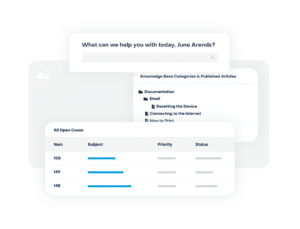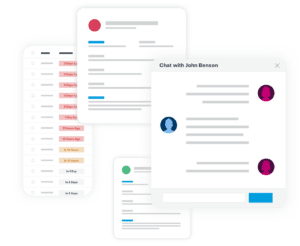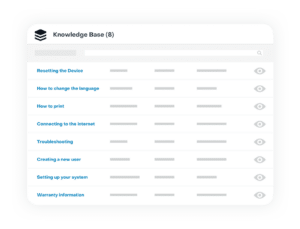How Sugar Serve Enables Customer Self-Service
Not every customer service inquiry requires a call with a live representative. Yet phone queues and chats are often jammed with people who could quickly get the information they need on their own—if only they had an outlet. Consumers seek a customer self-service portal to answer the standard questions that keep their use of your products and services running smoothly. Eighty-eight percent of U.S. consumers now expect it.
The right customer self-service software makes the difference in helping your audience find what they need while freeing up customer service reps to focus on more specialized and complex matters.
What is Customer Self-Service?
Customer self-service is exactly what it sounds like: a way for customers to help themselves when they’re looking for answers. Instead of contacting a representative, they use a customer self-service tool like:
- Portals
- Knowledge bases or wikis
- Discussion forums
- Mobile websites and FAQs
- Chatbots and automated systems
- Videos and tutorials
- Kiosks (in person)
- Automated phone systems like IVR (interactive voice response)
But how effective is customer self-service? Very. As consumers grow more mobile-dependent and want answers fast, they seek self-service methods over live agents to get what they need. Today, more than 60% of U.S. consumers say their go-to channel for simple inquiries is a digital self-serve tool.

Better for Them, Better for You
The benefits of customer self-service are many for both customers and brands. Self-service tools allow customers to:
- Bypass long wait times
- Choose their preferred method of service
- See personalized information (when logged in to their account)
- Form an online community
- Overcome spoken language barriers
At the same time, customer service teams can use self-service methods to improve customer satisfaction, reduce costs, and provide better brand experiences. Self-service solutions allow brands to:
- Free up overwhelmed agents
- Reduce call center costs
- Avoid multiple similar cases
- Shorten time to resolution
- Focus more intently on customers with unique challenges
Self-service portals and knowledge bases can provide additional training and education for employees as an added benefit. Knowledge bases full of FAQs, tutorials, step-by-step guides, and more offer easy ways to search and get what they need.
Common Problems that Customer Self-Service Can Solve
Customer self-service applies to nearly every industry. Many of the issues a customer might need to address with a live agent on the phone can be solved through a portal of common FAQs, articles, account details, chatbots, or other self-service methods. These problems can vary depending on the industry, but in general, self-service can help customers address common inquiries such as:
- Account balances and payments
- Account preferences and changes
- How-to’s for simple tasks and products (e.g., activating your new card)
- Appointments and service dates
- Training and demos
- Access to important documents
- Company hours and basic information
- Logging a ticket for further help
Who should use customer self-service? Everyone! The easier you make it to find answers, the more people you help (and the fewer tickets you have to create). This is why diversifying your customer self-service offering is essential. While younger generations may flock to social media for assistance, older demographics may prefer knowledge bases of concrete information they know the company has produced and approved.
How to Implement Customer Self-Service Solutions
Self-service options can be fairly easy to adopt and integrate into your existing service offerings. While solutions like portals, chatbots, and IVRs require outside customer service software, you can still get to work creating the valuable knowledge articles and content your customers will eventually reference for answers. This is why it’s most important to ensure customers can easily find what they’re looking for. You’ll need to:
- Organize and structure the information. Is your knowledge base intuitive? Will viewers be able to find what they’re looking for quickly? Most portals include a search bar, so the computer does the deep investigation instead of the customer.
- Choose the most relevant topics. What are your customers most likely to ask about? What do they typically ask about over the phone? Consider all aspects of your products or services, shipping, billing, returns policy, etc., to cover the full breadth of topics.
- Format your writing. For the search to work, the reader and the knowledge base itself need to see keywords that pertain to the topic they’re looking for. Like writing for blogs, knowledge articles must be clear, easy to read, and informative. Make sure your content is at its best by writing a descriptive title and content, avoiding typos, linking to other articles or helpful resources, and staying succinct, so readers get answers fast.
- Ensure accuracy through editing and approval. Workshop the content around your team or seek approval from other teams who manage the topics at hand. Ensure readers receive the most accurate, up-to-date answers possible.
- Upload/publish the content. Post articles regularly as new features come out or you discover new customer issues. Set a reminder to revisit certain pages later for optimization.
Remember the Goal: Effortless Experiences
Sure, there are challenges to customer self-service. While self-service gives customers autonomy to quickly and easily find the answers they need, it doesn’t negate the need for relationships with your brand. Self-service portals are a dynamic solution but only one part of the entire customer service process. Whether they talk to you on the phone or look up an answer on their device, all customers want is a frictionless experience.
Yet the pitfall of many self-service portals is that they don’t solve every issue or go overboard in explaining every historical detail about a particular product. When customers need a solution fast, the last thing they want is to sort through pages upon pages of information until they find it. Remember: a successful self-service portal is part of a comprehensive customer service strategy to create helpful and memorable customer experiences.

Sugar Serve Helps You Help Them
Not comfortable with building a self-service portal from scratch? Sugar Serve is SugarCRM’s customer service solution for outstanding customer experiences and simplified internal processes. With omnichannel customer service capabilities, Serve provides a streamlined platform that eliminates busy work and allows you to create effortless customer experiences.
We offer branded self-service technology so you can stand up a customer portal and knowledge base that speaks your language. Customers can easily search your knowledge base, get near-instant answers to questions, and open cases for extra assistance—all without ever picking up the phone. That means more deflected calls, lower call center costs, and improved customer satisfaction.

Plus, Sugar’s theme designer provides a WYSIWYG design tool to easily customize the look of your portal and ensure compliance with your company branding standards. You can optimize the user experience further with control over the visibility of fields, cases, and notes or define custom workflows using portal fields.
And for those times when they need deeper, more one-on-one live agent support, Sugar’s Self-Service Portal is where they can communicate with agents through SugarLive’s embedded chat, notes, and attachments. Either way, your customers have access to the answers they need when they need them.
See for yourself how Sugar Serve is different by watching our demo today.



